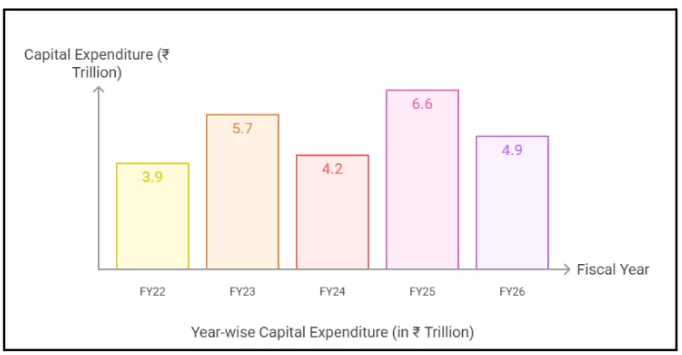Recently the Ministry of Statistics and Programme Implementation (MoSPI) released the first Forward-Looking Survey on Private Sector Capex Investment Intentions.
What is Capex?
- Capital Expenditure (Capex) refers to investments made by companies or the government in physical assets like machinery, buildings, and infrastructure, intended to increase production capacity or efficiency.
- Capex is a key driver of economic growth, job creation, and labour productivity.
- For India, high and consistent private sector Capex is vital to transition from a developing to a developed economy.
About the Survey
- Conducting Body: The survey was conducted by MoSPI, the nodal agency for statistical data in India.
- MoSPI operates under the Collection of Statistics Act, 2008, which mandates the collection of economic and social data.
- It also mandates data submission by enterprises for national policy use.
- Survey Coverage
- Time Period: Conducted between Nov 2024 – Jan 2025.
- Scope: Covered Capex trends over five years with actual data for FY22, FY23, FY24, and projected figures for FY25 and FY26.
- Participation: Out of 3,064 enterprises surveyed, 2,172 shared complete five-year Capex data.
 Key Observations
Key Observations-
- Capex increased by 66% between FY22 and FY25.
- Including FY26, overall growth drops to 23%, showing volatility.
- This underscores the inconsistent growth in private investment.
- Comparison with Public Sector Capex
- Government Capex grew by 230% from FY21 to FY25, showcasing a strong fiscal-led growth model.
- The Centre has consistently encouraged private sector participation through policy incentives, PLI schemes, and infrastructure push.
- Challenges of the Survey
- Companies cited legitimacy and cyber-risk concerns in sharing data.
- MoSPI cautioned that, being the first iteration, findings are indicative and subject to refinement.
Significance of the Survey
- This marks a significant step toward systematically tracking private sector capital expenditure (Capex), critical for understanding economic growth patterns in India.
- Policy Relevance
- Helps government and corporations make informed investment decisions.
- Enables better forecasting of economic trends and job creation potential.
- Supports the national goal of becoming a $5 trillion economy.
- Strategic Implications
- In a time of global economic uncertainty, tracking Capex helps India fine-tune its macro-economic planning.
- Supports institutions like NITI Aayog and the Finance Ministry in designing targeted interventions.
Conclusion
The launch of a formal mechanism to track private sector Capex is a forward-looking governance reform. While initial data indicates uneven investment patterns, the survey lays the groundwork for a robust database that can guide India’s development journey in the coming decades.
![]() 2 May 2025
2 May 2025

 Key Observations
Key Observations